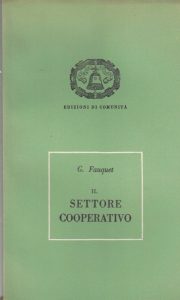He was the theorist of the cooperation as “third sector”, together with the public one and capitalist one. Unlike Gide, he interpreted the cooperative sector as complementary to the others in a mixed economy, not as a complete replacement (according to Fauquet there were four sectors: public, capitalist, private, cooperative).
Cooperativism as a part of the economy of a country, to Gide, represented the union between economic factor and social factor. So he wrote, identifying what for him were the two cornerstones of cooperativism:
In the cooperative institution two joint components will have consequently to be distinguished, a social one and an economic one:
1. An association of people who recognised and still recognises, on one hand, the similarity of some of their needs and on the other hand the possibility to better satisfy these needs by a joint undertaking rather than by individual means.
2. A common venture whose particular object corresponds precisely to the needs to be satisfied.
According to Fauquet’s way of thinking, cooperatives were service businesses that had to keep an optimal relationship between the quality of the services given and the prices requested, maintaining profit to be reinvested partly in their stocks.
Fauquet followed the development of French cooperatives and since the 1920s he was member of the Conseil Supérieur de la Coopération, of the national committee of Fédération Nationale des Coopératives de Consommation (FNCC) and of the ICA central committee- Alleanza Cooperativa Internazionale (International Cooperative Alliance).

Further readings:
• G. Fauquet , Il settore cooperativo, Edizioni di Comunità, Milano, 1948
• G. Fauquet, L’opera e l’uomo, Edizioni de “La Rivista della Cooperazione” Roma, 1953
• A Basevi, Giorgio Fauquet: Fannogli onere e di ciò fanno bene, in Studi Cooperativi, Edizioni de “La Rivista della Cooperazione”, Roma, 1953

